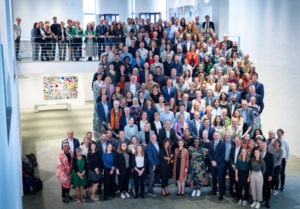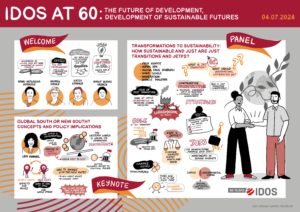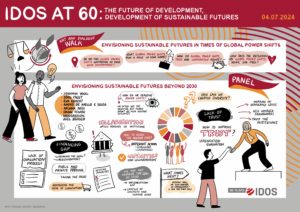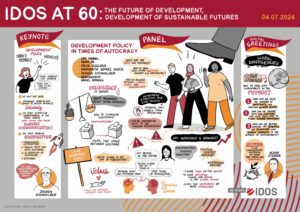To mark its 60th anniversary this year, the Institute looked back in a series of events in Berlin, Brussels and now with a major conference in Bonn, while at the same time looking forward to shaping ’sustainable futures‘ together.

The German Institute of Development and Sustainability (IDOS, formerly the German Development Institute, DIE) was founded in March 1964 with the mandate to train practitioners and post-graduates for working in the new field of development policy and support German development cooperation through research and policy advice. 60 years after the Institute was founded, we are delighted to be celebrating our 60th anniversary this year and, together with partners from academia, politics and civil society, to take a look back at the past 60 years, but above all at the future – or indeed ’sustainable futures‘.
Building on the anniversary event in Berlin, which IDOS hosted together with the Committee on Economic Cooperation and Development (AwZ) in the German Bundestag on 14 March, and the anniversary event in Brussels together with the European Think Tanks Group (ETTG) and the European Association of Development Institutes (EADI) at the Representation of the State of North Rhine-Westphalia on 16 April, the Institute’s Anniversary Conference took place at the Kunstmuseum in Bonn on 4 July 2024. While the event in Berlin and Brussels was aimed in particular at political decision-makers and focused on the importance of science and development research for German and European development policy, IDOS‘ anniversary conference in Bonn brought together researchers and practitioners to jointly reflect on the impact of geopolitical changes and current global challenges on inter- and multilateral development cooperation.
‘IDOS at 60: The future of development, development of sustainable futures’
Guided by the theme „IDOS at 60: The future of development, development of sustainable futures“, the participants explored the concept of sustainable futures from different starting points – futures in the plural, as they recognise that there are different ideas and designs for these transformation paths within the planetary ecological, economic, social and political boundaries. Following the welcome remarks by Prof. Anna-Katharina Hornidge, Director of IDOS, Katja Dörner, Mayor of the City of Bonn, Prof. Andrea Kienle, Director General for ‘Research’ at the Ministry of Culture and Science (MKW) of the State of North Rhine-Westphalia, and Prof. Birgit Ulrike Münch, Vice-Rector for International Affairs at the University of Bonn, Ambassador Dr Len Ishmael, Brussels Diplomatic Academy, spoke in her keynote speech about the changing relationship between the West and the so-called Global South. She emphasised how the world has changed in the last 60 years since the Institute was founded, spurred by economic and demographic developments, but above all by recent political conflicts such as the handling of the Covid-19 pandemic, the Russian war of aggression in Ukraine and the war in Israel and Gaza. Leading, on the one hand, to a loss of trust in the West and the international organisations established in the aftermath of the Second World War, and the establishment of a new global order on the other.
Keynotes and Panel discussions
The aforementioned geopolitical changes, the loss of trust in the West and the formation of a new global order were also reflected in the subsequent panel discussions. In a panel discussion moderated by Dr Daniele Malerba, IDOS, Prof. Felix Asante, University of Ghana, Prof. Kunal Sen, United Nations University World Institute for Development Economics (UNU WIDER), Prof. Imme Scholz, Heinrich Böll Foundation, and Alexia Faus Onbargi, IDOS, underlined the challenges of implementing a socio-ecological transformation, which can only succeed if both justice and environmental aspects are taken into account.
International cooperation is of central importance in order to counter internationally divergent interpretations of a „just transition“ and so-called spillover effects. However, as the following panel explained, the international implementation of these processes is jeopardised by the dwindling trust in established organisations. In the panel discussion moderated by Dr Axel Berger, IDOS, Prof. Archna Negi, Jawaharlal Nehru University, Prof. Jörg Faust, German Institute for Development Evaluation (Deval), Dr André de Mello e Souza, Instituto de Pesquisa Econômica Aplicada (IPEA), Dr Eva Kracht, Federal Ministry for the Environment, Nature Conservation, Nuclear Safety and Consumer Protection, and Dr Danai Tembo, Nelson Mandela University, discussed the impact of global power shifts on shaping an international sustainability agenda beyond 2030. The panellists emphasised how autocratisation processes, shifts in economic power and the renewed importance of security policy are weakening the trust and agency of established international institutions, while new international organisations and forums such as the BRICs or G20 are gaining in importance. Trust in institutions, cooperation with various non-state actors and the strengthening of internationally inclusive processes are therefore key aspects for shaping a post-2030 agenda.
This was followed by a keynote speech by Jochen Steinhilber, Head of Division at the Federal Ministry for Economic Cooperation and Development (BMZ). In his keynote speech, Jochen Steinhilber focussed on the role of communication between different worlds – both internally in the different social groups in Germany and internationally. He reflected on the importance of understanding cross-border cooperation, based on solidarity, interest- and value-orientated principles, not as a playground for small elites, but as part of the collective identity of German society. On the one hand, this requires a basic knowledge of and interest in development challenges worldwide and, on the other hand, it requires reliable discussions on this policy area based on facts, including in the political and media sphere. In recent months in particular, this has often not been the case. Instead, factual misrepresentations are used to defame the policy field, without reflecting on the fact that this polarising policy of international cooperation also plays into the hands of opposing forces in connection with the autocratisation processes that can already be observed.
The keynote was followed by a third panel discussion, moderated by Dr Daniel Nowack, IDOS, on the future of development policy in times of autocracy. The panellists Dr Len Ishmael, Jochen Steinhilber, Hawa Ba, Open Society Foundations, Colin Scicluna, European Commission, and Margarita Gómez García, Southern Voice, shed light on how the rise of right-wing populist parties within the EU has led to a loss of credibility for European actors in the field of democracy promotion. At the same time, Margarita Gómez García emphasised that the promotion of democratic processes and systems can only succeed if the local context is taken into account.
International cooperation essential for the future
While the keynote speeches and panel discussions focussed on the current challenges in the field of international cooperation, it also became clear that current global challenges in the economic, social and ecological fields can only be overcome together; cooperation and collaboration are a prerequisite for shaping sustainable futures in the future. In a concluding video message, Achim Steiner, United Nations Development Programme (UNDP) Administrator, emphasised that the era of development cooperation does not belong to the past, but actually belongs to the future “to solve problems that can only be solved in the future by working together.”
IDOS thanks its partners for the good and trustful cooperation over the past 60 years, for reflecting and celebrating together 60 years of research, policy advice and training for development policy and cooperation, and looks forward to continuing to co-shape a collaborative multipolar world for sustainable futures.





Schreibe einen Kommentar